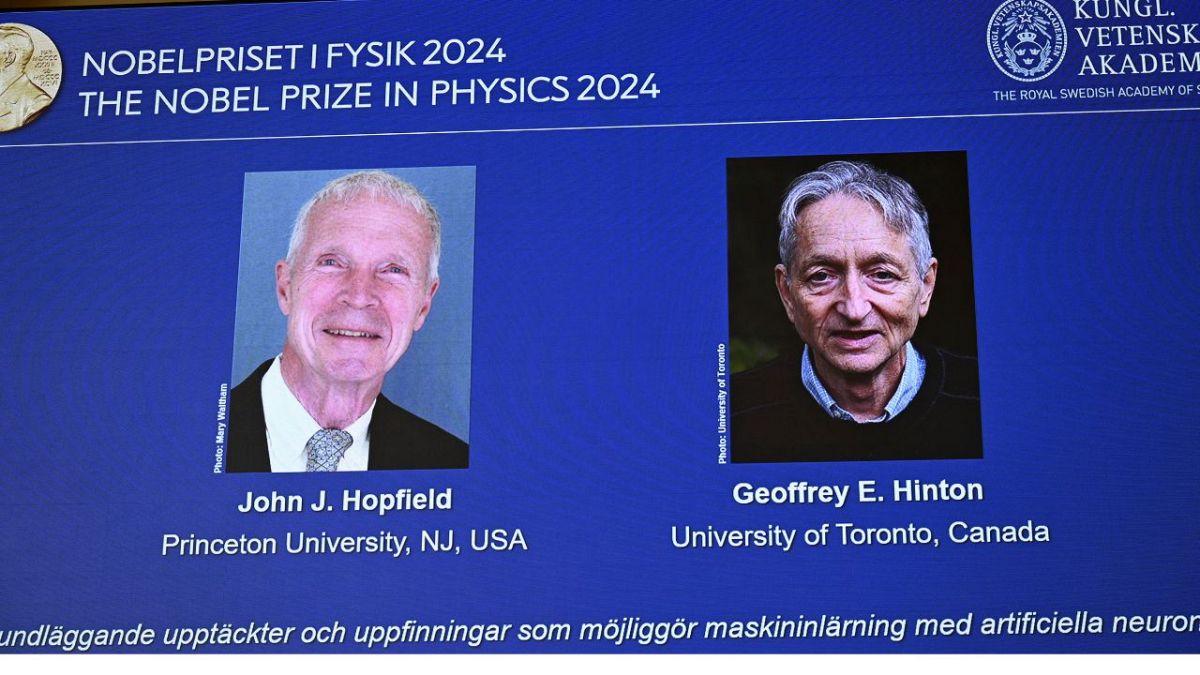Is AI physics or chemistry?: Nobel Prize debate on the role of technology in science

This week’s Nobel Prize announcements have focused largely on the use of AI, sparking debate over traditional science.
Artificial Intelligence (AI) reached the highest echelons of scientific achievement this week, winning Nobel Prize Winner in Physics And chemistryThe awards highlight the impact of technology on all aspects of our lives not only Debate has erupted and so has anger On social networks of researchers about the relationship of AI with these scientific topics.
“I’m at a loss for words. I love machine learning and artificial neural networks as much as anyone, but I have a hard time seeing this as a discovery of physics.” Astronomer Jonathan Pritchard of Imperial College London wrote in X. “I think the Nobel Prize has been influenced by the hype about artificial intelligence,” he said.
Who is usually awarded the Nobel Prize? Research that has been done for decades and whose impact is considered to be of “the greatest benefit to humanity”.
winners
one of the so-called “Godfather of AI”, Geoffrey Hinton, and professor and physicist John Hopfield He was awarded the Nobel Prize in Physics on Tuesday for his work, begun in the 1980s, of inventing artificial neural networks based on physics concepts that drove and influenced the development of AI.
One day later, AI is in the news again Google DeepMind CEO Demis Hassabis, DeepMind Director John Jumper and University of Washington Professor David Baker jointly won the chemistry prize for their work on proteins.
Baker received praise for his work on an AI-based protein prediction tool called RoseTTFold and development of new proteinsHassabis and Jumper, for their part, developed an AI system that solved a 50-year-old problem in predicting the structure of proteins.
“It is too early to talk about AI being involved in all awards”Hassabis said at a news conference. “Human ingenuity comes first – asking questions, developing hypotheses – and AI systems can’t do any of that. Right now, They limit themselves to analyzing dataIt was interesting, he said, that the committee decided to make a statement with two AI-related awards.
Is AI related to physics and chemistry?
“My first reaction was we’re not taking AI seriously,” said David Vivancos, CEO of deep learning and AI organization MindBigData.com. “I’m a big fan of (Hinton and Hopefield) and they’ve made an amazing discovery. But the thing is, does not belong to the field of physicsUnless we think that physics is everything,” he told Euronews Next.
According to the Oxford English Dictionary (OED), physics is described as “the branch of science dealing with the nature and properties of inanimate matter and energy.” something that’s physically there,
Vivancos explained his view that physics is “tied to something physical, it’s something real,” while in terms of how AI behaves “it’s more to do with something that happens.” in the computer’s mind Rather than a physical being.” But can AI be related to chemistry? In the case of the Nobel Prizes, it can be said yes because it is about computational chemistryWhich uses computer simulations to help solve complex chemical problems.
“Using AI to predict protein structure This is a great advancement with countless applications. in biology, medicine and other fields,” Andy Cooper, professor of chemistry at the University of Liverpool and director of the Materials Innovation Factory and Leverhulme Center for Functional Materials Design, said in a statement.
,AI will also impact other areas of chemistryBut the protein sector has some special features. “First, there is a large amount of well-curated training data. Second, proteins are structurally complex but structurally quite simple: they are built from a fairly narrow selection of building blocks,” he adds.
There are different types of AILike generative, but in general terms it is defined as a technology that allows computers and machines to simulate human learning, understanding, and problem solving.
AI’s “triumph of intersubjectivity”.
If AI is to fit into traditional science, maybe it’s closer to mathematicsVivancos said. but it can also happen biology or neuroscienceBecause of algorithms that can help researchers sort through vast libraries of genetic data.
AI can fit into most categories and can be said to be It will affect the lives of all of us at some level or the other.For example, the technology has been used to manage road traffic in real time, navigation applications like Google Maps, and even in everyday objects like robot vacuum cleaners.
The Nobel Prize in Chemistry and Physics has been awarded for the use of AI. “The Triumph of Interdisciplinarity” of technology, says Virginia Dignam, professor in the department of computer science at Umeå University in Sweden, who also heads the university’s Social Artificial Intelligence and Ethics research group.
“The true progress of science is no longer the domain of any one discipline, but A comprehensive approach is needed And a combination of different approaches,” he told Euronews Next.
“AI is here to be an accelerator and support for exploring large research spaces, a tool that can Analyze huge data setspredict outcomes and even suggest new hypotheses“Improving capabilities of researchers in fields like biology, physics, chemistry and medicine,” he said.
But Dignam said the prize is not about AI’s place in the Nobel Prize, but about breadth of vision and “respectful attitude of scientists” and how much can be learned. Dignam said, “Perhaps it is time to modernize the Nobel Prizes to recognize that the discoveries that really matter lie beyond the traditional division into disciplines.”
(TagstoTranslate)Artificial Intelligence(T)Nobel Prize(T)Science(T)Google
